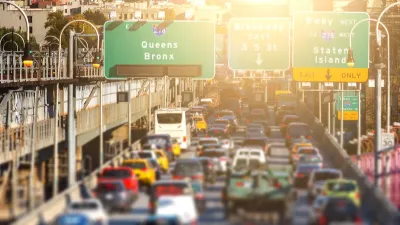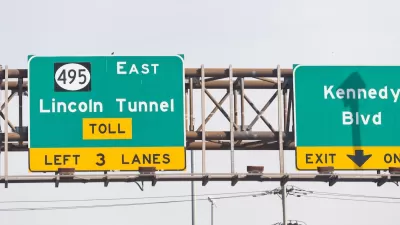Due to its successful application in cities such as London and Singapore, congestion charging has become the favored approach for changing driver behavior. However, a professor at Stanford University may have found a nicer way to change habits.
With efforts to impose congestion pricing in the United States having failed thus far, most prominently in New York City, Balaji Prabhakar, a professor of computer science at Stanford University may have found an incentive-based program to accomplish similar goals, reports John Markoff.
Choosing the carrot over the stick, Stanford deployed a new system designed by
Dr. Prabhakar's group this spring with the aim of reducing traffic congestion at peak hours. "Called Capri, for Congestion and Parking Relief Incentives,
it allows people driving to the notoriously traffic-clogged campus to
enter a daily lottery, with a chance to win up to an extra $50 in their
paycheck, just by shifting their commute to off-peak times."
"Dr. Prabhakar is a specialist in designing computer networks and has conducted a variety of experiments
in using incentives to get people to change their behavior in driving,
taking public transit, parking and even adopting a more active
lifestyle. Unlike congestion pricing,
which is mandatory for everyone and usually requires legislation,
"incentives can be started incrementally and are voluntary," he said."
"Moreover, systems based on incentives can offer a huge advantage in
simplicity. Until recently, the Stanford system required sensors around
campus to detect signals from radio-frequency identification tags that
participants carried in their cars. But the need for such an
infrastructure has vanished now that so many drivers carry smartphones
with GPS chips or other locaters."
While Markoff notes that Stanford plans to expand the popular program soon to cover parking on campus, experts disagree on whether an incentives-based system could work as well in a city such as New York or San Francisco.
FULL STORY: Incentives for Drivers Who Avoid Traffic Jams

Manufactured Crisis: Losing the Nation’s Largest Source of Unsubsidized Affordable Housing
Manufactured housing communities have long been an affordable housing option for millions of people living in the U.S., but that affordability is disappearing rapidly. How did we get here?

Americans May Be Stuck — But Why?
Americans are moving a lot less than they once did, and that is a problem. While Yoni Applebaum, in his highly-publicized article Stuck, gets the reasons badly wrong, it's still important to ask: why are we moving so much less than before?

Research Shows More Roads = More Driving
A national study shows, once again, that increasing road supply induces additional vehicle travel, particularly over the long run.

Judge Halts Enforcement of Anti-Homeless Laws in Grants Pass
The Oregon city will be barred from enforcing two ordinances that prosecute unhoused residents until it increases capacity and accessibility at designated camping sites.

Advancing Sustainability in Los Angeles County Schools
The Los Angeles County Office of Education’s Green Schools Symposium brings together educators, students, and experts to advance sustainability in schools through innovative design, climate resilience strategies, and collaborative learning.

Using Old Oil and Gas Wells for Green Energy Storage
Penn State researchers have found that repurposing abandoned oil and gas wells for geothermal-assisted compressed-air energy storage can boost efficiency, reduce environmental risks, and support clean energy and job transitions.
Urban Design for Planners 1: Software Tools
This six-course series explores essential urban design concepts using open source software and equips planners with the tools they need to participate fully in the urban design process.
Planning for Universal Design
Learn the tools for implementing Universal Design in planning regulations.
City of Moreno Valley
Institute for Housing and Urban Development Studies (IHS)
City of Grandview
Harvard GSD Executive Education
NYU Wagner Graduate School of Public Service
City of Cambridge, Maryland
Newport County Development Council: Connect Greater Newport





























